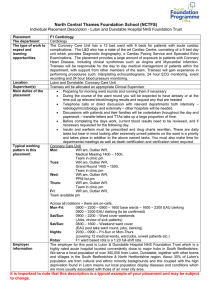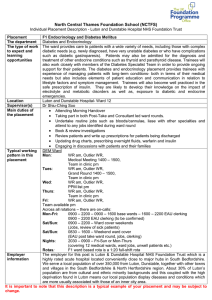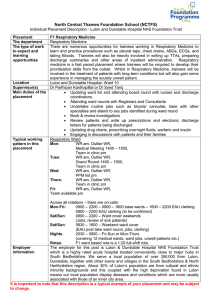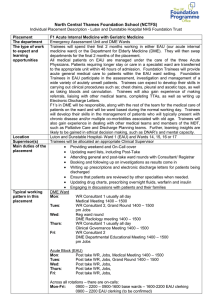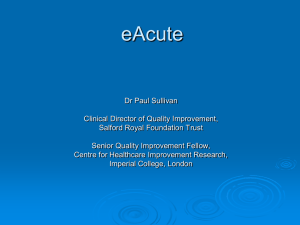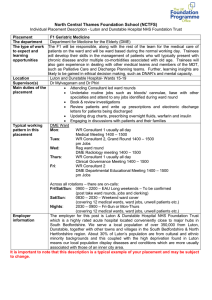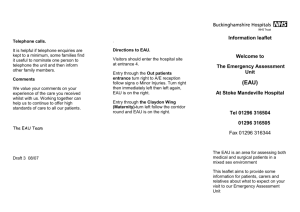North Central Thames Foundation School (NCTFS)
advertisement
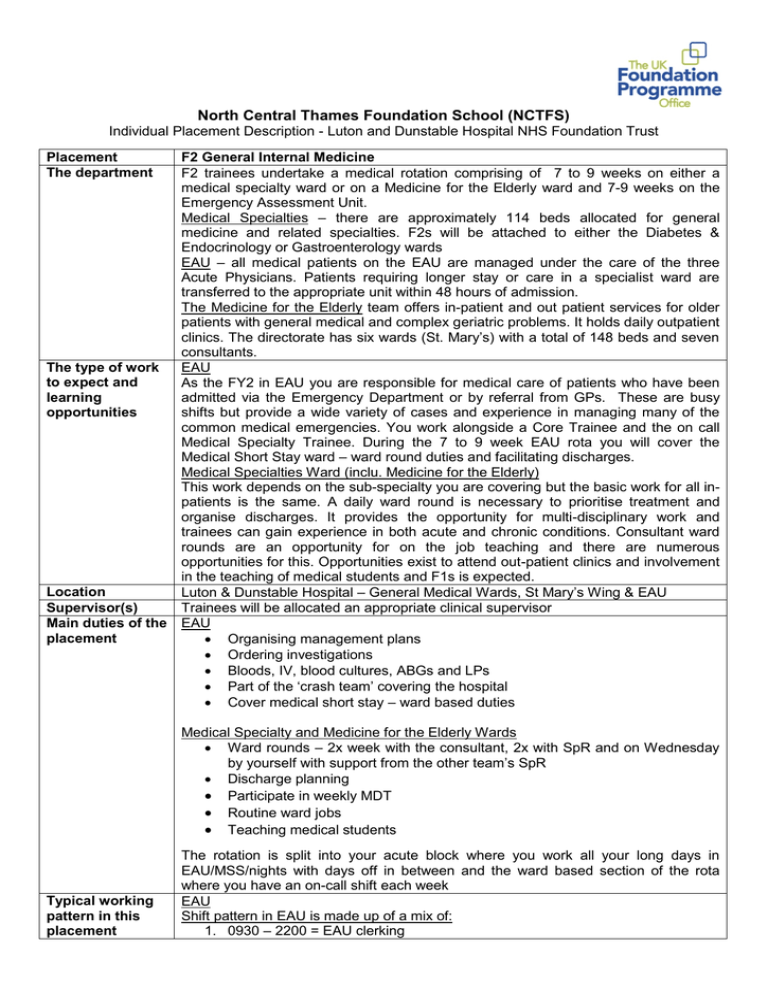
North Central Thames Foundation School (NCTFS) Individual Placement Description - Luton and Dunstable Hospital NHS Foundation Trust Placement The department The type of work to expect and learning opportunities Location Supervisor(s) Main duties of the placement F2 General Internal Medicine F2 trainees undertake a medical rotation comprising of 7 to 9 weeks on either a medical specialty ward or on a Medicine for the Elderly ward and 7-9 weeks on the Emergency Assessment Unit. Medical Specialties – there are approximately 114 beds allocated for general medicine and related specialties. F2s will be attached to either the Diabetes & Endocrinology or Gastroenterology wards EAU – all medical patients on the EAU are managed under the care of the three Acute Physicians. Patients requiring longer stay or care in a specialist ward are transferred to the appropriate unit within 48 hours of admission. The Medicine for the Elderly team offers in-patient and out patient services for older patients with general medical and complex geriatric problems. It holds daily outpatient clinics. The directorate has six wards (St. Mary’s) with a total of 148 beds and seven consultants. EAU As the FY2 in EAU you are responsible for medical care of patients who have been admitted via the Emergency Department or by referral from GPs. These are busy shifts but provide a wide variety of cases and experience in managing many of the common medical emergencies. You work alongside a Core Trainee and the on call Medical Specialty Trainee. During the 7 to 9 week EAU rota you will cover the Medical Short Stay ward – ward round duties and facilitating discharges. Medical Specialties Ward (inclu. Medicine for the Elderly) This work depends on the sub-specialty you are covering but the basic work for all inpatients is the same. A daily ward round is necessary to prioritise treatment and organise discharges. It provides the opportunity for multi-disciplinary work and trainees can gain experience in both acute and chronic conditions. Consultant ward rounds are an opportunity for on the job teaching and there are numerous opportunities for this. Opportunities exist to attend out-patient clinics and involvement in the teaching of medical students and F1s is expected. Luton & Dunstable Hospital – General Medical Wards, St Mary’s Wing & EAU Trainees will be allocated an appropriate clinical supervisor EAU Organising management plans Ordering investigations Bloods, IV, blood cultures, ABGs and LPs Part of the ‘crash team’ covering the hospital Cover medical short stay – ward based duties Medical Specialty and Medicine for the Elderly Wards Ward rounds – 2x week with the consultant, 2x with SpR and on Wednesday by yourself with support from the other team’s SpR Discharge planning Participate in weekly MDT Routine ward jobs Teaching medical students Typical working pattern in this placement The rotation is split into your acute block where you work all your long days in EAU/MSS/nights with days off in between and the ward based section of the rota where you have an on-call shift each week EAU Shift pattern in EAU is made up of a mix of: 1. 0930 – 2200 = EAU clerking 2. 0900 – 1700 = MSS ward duties 3. 1700 – midnight = Twilight shift in EAU clerking (1 week of these in the whole placement) 4. Nights 2100 – 0900 clerking and helping FY2 on ward Medical Specialty and Medicine for the Elderly Wards Mon – Fri 0900 – 1700 ward round and duties 1 x on call shift each week covering the wards 0900 – 1700 on your ward then pick up the on-call bleep to cover the wards until 2100 Employer The employer for this post is Luton & Dunstable Hospital NHS Foundation Trust information which is a highly rated acute hospital located conveniently close to major hubs in South Bedfordshire. We serve a local population of over 350,000 from Luton, Dunstable, together with other towns and villages in the South Bedfordshire & North Hertfordshire region. About 30% of Luton’s population are from cultural and ethnic minority backgrounds and this coupled with the high deprivation found in Luton means our local population display diseases and conditions which are more usually associated with those of an inner city area. It is important to note that this description is a typical example of your placement and may be subject to change.
